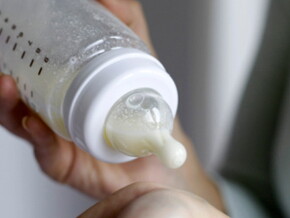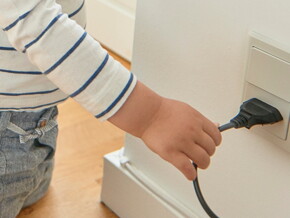
Sleepy-time tips
If you watch your baby sleep, you’ll see that even though their eyes are closed, there’s rarely a dull moment. Dreaming, irregular breathing and twitching are all part of their active sleep which makes up most of their downtime in the early days.Until your baby starts sleeping more soundly (older baby = deeper sleeper), you should aim to put them down at the same time every night and follow the same bedtime rituals. It’s common for babies to seem like they have their days and nights mixed up in the first few weeks. They’ll figure it out.Soft background noise like a fan, gentle music or a ticking clock can help them doze off peacefully.Wait until three months to start teaching them to fall asleep on their own by putting them in the crib when they’re still drowsy, but not yet sound asleep.
Newborns to 3-month-olds
When?
Leave newborn sleep development to nature when they need sleep, they’ll sleep. You don’t need a schedule, nor should you try to get them to sleep through the night. Although, if you notice them feeding more during the day, it could be an indication that they’re storing up food to sleep longer at night, which is good news for you.
How muchdaily sleep will they need?
Your baby will need between 16 and 18 hours of sleep a day. Like most newborns, they’ll probably wake up every two to three hours but go back to sleep pretty much right after they eat. This means they’re comfortable and getting enough to eat (again, good news for you). At about the two-week mark, newborn sleep development patterns change, and you'll notice longer periods of sleeping and wakefulness.
What can I do?
- Provide your newborn with a sense of security that you're there for them when they’re awake.
- Keep their sleeping room dark and quiet at night and try to stimulate them only during the day.
- Prepare to have a bassinet, cradle or play yard ready in case your baby isn’t comfortable going from the womb directly to a crib.
- Let them, as the Canadian Paediatric Society recommends, sleep in their own safe environment and not in bed with you.
- Feel free to have them share your room (where space allows) for a few months.
- Always put your baby down on their back to help reduce the risk of sudden infant death syndrome (SIDS).
Suggested reading
3 to 6-month-olds
When?
Your life will probably become more predictable around the four-month mark as your baby may start sleeping through the night, while tossing in a few naps during the day. However, they may wake up once in the night to be fed, especially if you’re breastfeeding.
How many daily naps will they need?
Your baby will likely need three naps of various lengths (naps actually help them sleep through the night more consistently).
Continue to give your baby a chance to learn “self-comforting” (and increase the odds he falls asleep on his own through the night) by putting him down when he’s sleepy but still awake.
What can I do?
- Make sure your baby gets their night feeding as well as your attention. They may be crying for a reason other than hunger and you'll want to reassure them.
- Continue to give your baby a chance to “self-comfort” (and increase the odds they fall asleep on their own through the night) by putting them down when they’re sleepy but still awake.
7 to 12-month-olds
With life even more in order, your baby may now be sleeping through the night and be fine with a couple of scheduled naps.
How much daily sleep will they need?
Your baby should now sleep between eight and ten hours a night, and about 15 hours a day.
What can I do?
- Unless they’re sick, don’t rush back to your baby’s room if they cry. Give them time to fall back asleep on their own.
- Only check on them if their crying lasts a few minutes, and do not pick them up right away. Rubbing their tummy while humming a familiar song can help relax them back to sleep.
- Make sure your crib is sturdy enough to handle your baby’s ever-growing strength (babies are surprisingly powerful).
- Adjust the crib mattress height to prevent escape.
Toddlers
Somewhere between 12 and 18 months, your toddler will probably attempt to switch from two naps to one nap, in addition to sleeping all night.
Napping’s Benefitzzz…
Naps are an essential part of newborn sleep development, as they aid with physical growth, rest, restoration, mood and brain development. A napping baby is your opportunity to reset yourself, be it a nap for yourself, an extra load of laundry or a mini Netflix marathon.
In case your curious toddler wants to practise mastering new skills in favour of sleep, try these naptime tips:
- Keep a consistent sleeping location.
- Simulate nighttime during naps with blackout blinds.
- Make naptime the same time each day (like a half hour after playtime or after lunch).
- Start a countdown, "10 more minutes and it’s time to lie down."
- Calm them down before naptime with quiet play, reading or easy listening.
- Avoid letting them sleep in the car or stroller (anything that’ll disrupt their schedule).
- Schedule early afternoon naps if you can; any time before 3 or 4 o'clock is good.
Counting the hours
So, your little one is trying to make his own sleep schedule, and you want to make sure he's getting the rest he needs—here’s how his sleep compares to other babies:
| Age | Number of naps | Length of time | Nighttime |
|---|---|---|---|
| 12 months | 1-2 | 2-3 hours | 7-9 hours |
| 2 years | 1 | 1-2 hours | 10-12 hours |
Watching for sleepy signals
Don’t wait! Start your nap routine at the first sign of tiredness (Crankiness leads to sleeplessness).
Your toddler will give you these sleepy cues:
- Decreased activity and lower energy levels.
- Quieting down.
- Losing interest in people or toys.
- Rubbing eyes, or 'glazing over'.
- Fussing.
- Yawning.
- Laying down.
- Finding his blankie.
- Asking for a pacifier or bottle.
Embracing quiet time
When your baby’s second nap has worked its way out of your routine, replace it with some quiet time so they still get the restful break they need. You can help quiet time fly by with some alone time. Give them a picture book, a blankie or stuffy, and some quiet music or background noise.Before you know it, your toddler will be two and probably be ready to relax after lunch. Take advantage by reading a story to get them settled for a nap. Whether they sleep or not, the relaxation and change of pace are just two gentle ways to provide them with some much-needed rest.






















